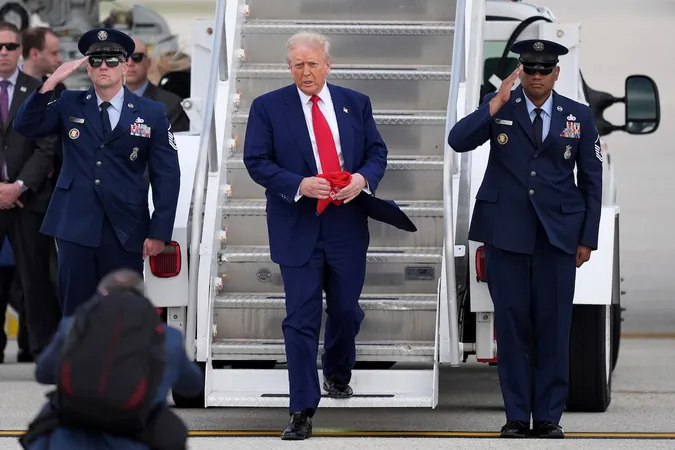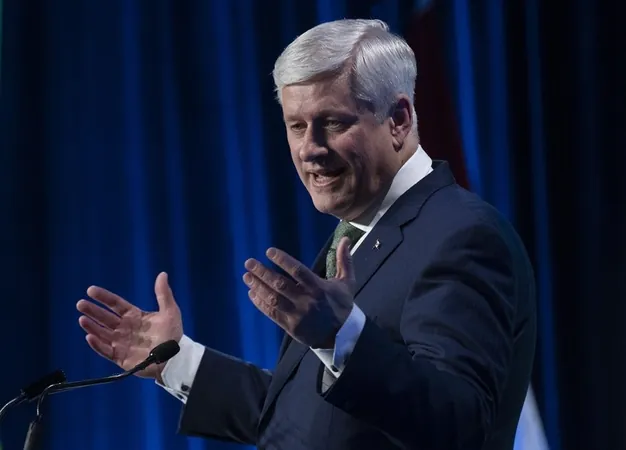
Trump Shocks Washington with Sudden Firing of NSA Director Tim Haugh Amid Growing Controversy
2025-04-04
Author: Charlotte
Introduction
In a surprising move, U.S. President Donald Trump has terminated Air Force Gen. Tim Haugh from his position as the director of the National Security Agency (NSA). Sources from the U.S. government, including congressional members, have confirmed the firing but neither the White House nor the Pentagon has provided any official explanation for this unprecedented decision.
Background on Tim Haugh's Dismissal
Military officials learned on Thursday about the dismissal of Haugh, a four-star general with a distinguished 33-year career in intelligence and cyber operations. His sudden removal raises serious questions, particularly since senior military leaders were not informed beforehand about such a significant personnel change. The role Haugh previously held also included oversight of the Pentagon's Cyber Command, which is crucial for national defense against cyber threats.
Reactions and Controversy
The dismissal has sparked outrage among lawmakers, prompting calls for an immediate and transparent explanation from the administration. Critics argue that this firing fits a troubling pattern of purging national security officials by Trump, especially at a time when the administration faces scrutiny for its handling of sensitive intelligence matters.
Additional Dismissals
In addition to Haugh, the NSA’s civilian deputy, Wendy Noble, was also relieved of her duties. While the NSA informed congressional leaders of their firings, no reasons were provided. Noble has since been reassigned to a role in the office of the undersecretary of defense for intelligence.
Administration's Silence
The response from the Trump administration has been largely muted. Pentagon spokesperson Sean Parnell expressed gratitude for Haugh’s service without addressing the reasons for his dismissal. The absence of clear communication leaves many questioning who will now lead both the NSA and Cyber Command at such a critical juncture for U.S. cybersecurity.
Involvement of Activist Laura Loomer
The situation has been exacerbated by statements from far-right activist Laura Loomer, who claimed credit for bringing Haugh's alleged connections to Gen. Mark Milley and the Biden administration to Trump’s attention. Loomer, known for her controversial views and conspiracy theories, suggested Haugh’s loyalty was in question, arguing that the NSA should not be led by a "Biden nominee."
Legislative Concerns
The fallout continued, with Rep. Jim Himes of Connecticut—a member of the House Intelligence Committee—challenging the administration over the dismissals. He labeled the decision as indicative of political interference in national security matters, citing reports that suggest personal vendettas could be influencing personnel decisions.
Worries from Senate
Senators from both sides of the aisle expressed their worry about the impact of such actions on military and national security norms. Sen. Jack Reed stated that the firings convey a worrying message to military officials about providing honest advice for fear of retaliation.
Future of Haugh's Career
Amid these tensions, the NSA will undergo a 60-day process to determine Haugh’s status, as he could revert to a two-star position unless reassigned. Given the lack of trust surrounding his removal, it seems unlikely that he will receive another high-ranking position without a nomination from Trump.
Ongoing National Security Concerns
As the political storm brews, Trump continues to face calls for accountability regarding recent national security lapses. Alarmingly, the administration’s national security adviser is also under fire for allegedly mishandling classified discussions on a commercial encrypted messaging app.
Conclusion
With Haugh’s exit, many defense and intelligence experts are left pondering the future of U.S. national security leadership at a time when cyber threats from adversarial nations like China and Russia are more pervasive than ever. Critics assert that this shake-up represents a dangerous gamble that could destabilize America’s defenses and allies during ongoing global crises.
As the story unfolds, it remains crucial for the American public to monitor how these changes may affect national security strategies and the integrity of intelligence operations in an increasingly complex world.









 Brasil (PT)
Brasil (PT)
 Canada (EN)
Canada (EN)
 Chile (ES)
Chile (ES)
 Česko (CS)
Česko (CS)
 대한민국 (KO)
대한민국 (KO)
 España (ES)
España (ES)
 France (FR)
France (FR)
 Hong Kong (EN)
Hong Kong (EN)
 Italia (IT)
Italia (IT)
 日本 (JA)
日本 (JA)
 Magyarország (HU)
Magyarország (HU)
 Norge (NO)
Norge (NO)
 Polska (PL)
Polska (PL)
 Schweiz (DE)
Schweiz (DE)
 Singapore (EN)
Singapore (EN)
 Sverige (SV)
Sverige (SV)
 Suomi (FI)
Suomi (FI)
 Türkiye (TR)
Türkiye (TR)
 الإمارات العربية المتحدة (AR)
الإمارات العربية المتحدة (AR)